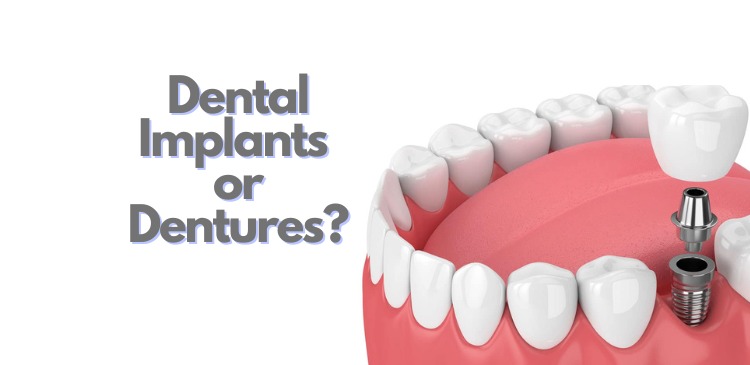Missing teeth aren’t only unhealthy for your mouth; they will also impact your overall health and self-esteem or vanity.
If you’re missing one tooth, there’s no reason to be embarrassed. Tooth loss is pretty common, not only for elderly people but for younger individuals as well. Nearly 70% of adults aged 35 to 44 have at least one missing tooth, and 1 in 4 people over the age of 74 are missing all of their teeth.
According to History Channel, our forefathers used to replace their missing teeth with dentures which are made up of a mixture of rare hippopotamus ivory, human bone, and metal fasteners. Luckily, we’ve got better choices offered these days.
Dental Implants and Dentures will facilitate restoring confidence in your smile and keep your mouth healthy. If you’re having trouble deciding which option is best for you, we are breaking down things; therefore, you don’t have to, like sharing the advantages and disadvantages of every option.
What are Dentures?
Dentures are removable appliances for your mouth. They replace each missing tooth also some of the gum tissues. Dentures are made from a pink gum-colored acrylic base. This base supports the denture teeth. Some dentures can include a lightweight metal framework that has added strength and support.
With dentures, you have got 2 options: removable complete dentures and partial dentures.
Complete Dentures.
First, complete dentures replace all the teeth in the upper or the lower jaw or both jaws. It rests directly on the gums.
Partial Dentures.
Partial Dentures, on the opposite hand, are used to fill in gaps. Due to this these partial dentures are more usually used when some of the natural teeth remain. These dentures are supported by clasps around the existing teeth. Partial dentures can also be attached with precision attachments that are fitted onto crowns.
Advantages of Dentures.
- Dentures are less costly than implants.
- Dentures are often placed on patients who have experienced bone and gum loss, unlike implants, that must be anchored to bone.
- The procedure for fitting dentures is non-invasive. Also, drilling into the bone is a part of the implant process and is not needed for dentures.
- The process to make dentures is comparatively fast, and only needs about 4 dental visits.
Disadvantages of Dentures.
- The adjustments or replacements are also necessary because of the structure of your face and gums changes with the age.
- Dentures will take some time to get used to and will be uncomfortable at first, especially during the first to the second day of wearing them. You may experience increased salivation, difficulty in chewing, and also have difficulty speaking.
- Just like regular teeth, dentures also require daily care. Infection around the mouth and also around the gums will occur if your dentures aren’t properly cared for.
What are Dental Implants and what is the way it works?
An implant is a titanium post which is a metallic element that’s inserted into the jawbone. Dental implants replicate the root or foundation of the natural tooth. This is a permanent solution for replacing a missing tooth or teeth. The implant post bonds very strongly with the jawbone.
This option may be used to either replace single or multiple teeth, supporting crowns, and even dentures. Implants are almost like natural teeth. They need similar care and can even last you a lifetime.
Additionally, dental implants will helps you to maintain the structure of your jaw, preventing the sunken-in facial look that’s typically seen in patients with tooth loss.
Working on Dental Implants.
For dental implants to be placed, a titanium post is first placed in the bone. This acts as an anchor for a brand new tooth that’s placed on the top of the post.
This procedure needs a high level of experience to do properly and safely, thus it’s best to look for a dental clinic with experienced professionals.
The placement of an implant typically involves the subsequent steps:
- The implant is placed surgically into the jawbone.
- As you heal, your implant will bond, or fuse with your natural jawbone. Both the teeth will grow together to form a strong and durable foundation for your replacement teeth. The healing method will take weeks or months, however, it will happen while you proceed along with your everyday life.
- After the implant bonds with the jawbone, a small connector referred to as an abutment is placed on the top of the implant. This connects the implant with the replacement tooth.
- Finally, an individual tooth, an implant-supported bridge, or dentures containing multiple teeth are connected to the abutment.
Before any of the above steps are taken, however, you will have to meet with an implant medical practitioner to develop your treatment arrangements.
Advantages of Dental Implant.
- Dental implants are unbelievably successful-they have a higher than 95% success rate.
- Long-lasting, the implants can hold up for 20 years or more.
- Like regular teeth, dental implants are very easy to take care of.
- It preserves the integrity of your facial structure and jaw bones.
- It acts similar to regular teeth, implants permit the bone to continue to grow.
- It is possible to induce dental implants in a single day. Keep in mind that the procedure will need follow-ups.
Disadvantages of Dental Implant.
- When coming to the price structure of dental implants and dentures, dentures are the cheaper selection.
- Not everyone seems to be a candidate for dental implants since implants want healthy bones and gums to secure properly to the jaw. Bone and tissue grafts will be done, however, which will additionally rack up the price.
Things to think about when selecting Dental Implants vs Dentures.
Of course, you’ll be able to weigh the advantages and disadvantages of dental implants and dentures. However, the proper choice can vary reckoning on the individual.
Here are some factors to think about when deciding between dental implants vs dentures:
-
Insurance Coverage.
Dentures are sometimes folded by most dental insurance plans. Dental implants, however, are usually classified as a cosmetic procedure. This implies that the costs sometimes aren’t covered.
-
Durability.
Dental implants that are properly cared for last for many years. This implies that costs will be lower in the long run, since dentures, as compared, will need replacements often frequently.
-
Long-term Oral Health.
By stimulating them with the forces made by chewing, implants can help to preserve bone and prevent gum tissue from shrinking. This additionally reduces your risk of losing more teeth. Dentures, on the opposite hand, don’t have this impact. An ill-fitting restoration may even accelerate bone loss in some cases.
-
Oral Hygiene.
Dentures have to be cleaned meticulously daily. Implants, however, are often maintained just by brushing and flossing, as you’d do with regular teeth.
-
Improved Appearance.
Implants look and function very naturally and in a way that’s like your teeth. As compared, dentures can feel bulky.
You should make the right choice between dentures or implants carefully and in consultation with your dental practitioner.
Though implants are costlier, they may give 20 or more years of service compared to dentures, which may need occasional adjustments or replacements throughout the year.
If you look carefully at the least bit of your choices to replace your missing teeth and consider your priorities and what you want the medical specialty to accomplish, you must be able to make a final decision confidently.




